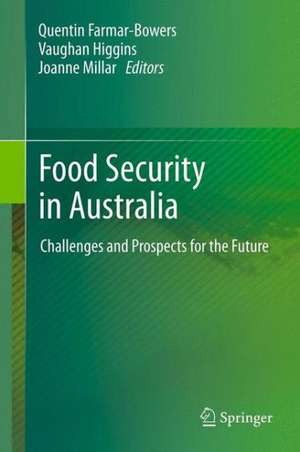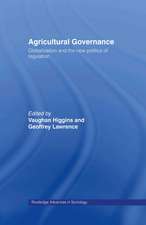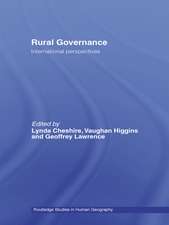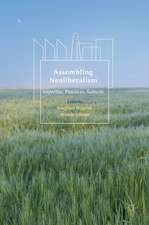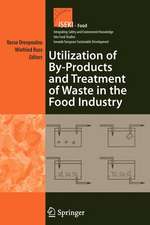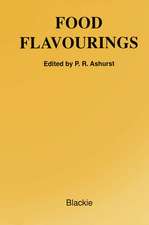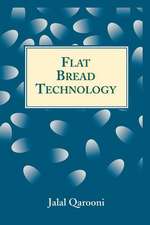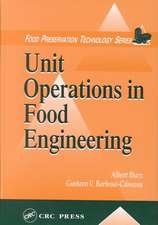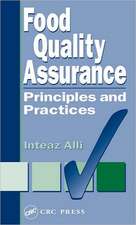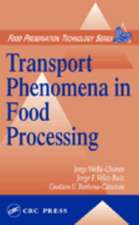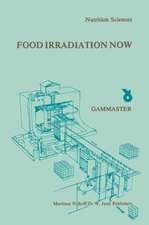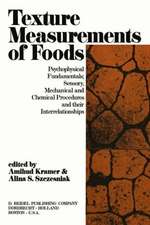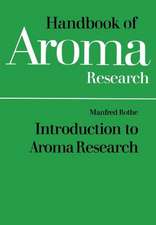Food Security in Australia: Challenges and Prospects for the Future
Editat de Quentin Farmar-Bowers, Vaughan Higgins, Joanne Millaren Limba Engleză Hardback – 28 oct 2012
The unique features of the book include the following:
• Most literature on food security pertains to developing countries. By way of contrast, this book explores food security in a developed nation (Australia) that seemingly should not have food security issues. The topics covered in the book are relevant to other developed nations with growing populations and resource management challenges.
• The book chapters are written by specialists to paint a comprehensive picture of the political, social, economic and environmental issues that give rise to food insecurity, and the challenges these issues present to the security of the food system in coming decades. The overall organization of the book uses a theoretically informed and multi-disciplinary approach. This enables a critical and in-depth analysis of food security by outlining the key challenges as well as prospects for the development of more sustainable and resilient agri-food systems.
• The three principal topics in the book are dealt with by a multi-disciplinary team of authors in a way that teases out diverse points of view illustrating the complexity of food security. Author disciplines include health and nutrition, agriculture, ethics, social science, law, and practitioners managing food aid programs.
• The book shows how food security relates to many technical, social and moral issues in society and how it is possible to develop successful programs to improve food security.
| Toate formatele și edițiile | Preț | Express |
|---|---|---|
| Paperback (1) | 954.14 lei 43-57 zile | |
| Springer Us – 8 noi 2014 | 954.14 lei 43-57 zile | |
| Hardback (1) | 961.55 lei 43-57 zile | |
| Springer Us – 28 oct 2012 | 961.55 lei 43-57 zile |
Preț: 961.55 lei
Preț vechi: 1172.62 lei
-18% Nou
Puncte Express: 1442
Preț estimativ în valută:
184.05€ • 199.99$ • 154.70£
184.05€ • 199.99$ • 154.70£
Carte tipărită la comandă
Livrare economică 21 aprilie-05 mai
Preluare comenzi: 021 569.72.76
Specificații
ISBN-13: 9781461444831
ISBN-10: 1461444837
Pagini: 430
Ilustrații: XXIV, 476 p.
Dimensiuni: 155 x 235 x 32 mm
Greutate: 0.91 kg
Ediția:2013
Editura: Springer Us
Colecția Springer
Locul publicării:New York, NY, United States
ISBN-10: 1461444837
Pagini: 430
Ilustrații: XXIV, 476 p.
Dimensiuni: 155 x 235 x 32 mm
Greutate: 0.91 kg
Ediția:2013
Editura: Springer Us
Colecția Springer
Locul publicării:New York, NY, United States
Public țintă
Professional/practitionerCuprins
1. Introduction: The Food Security Problem in Australia.- Part I. Food Equity and Access.- 2. Food Security in Australia – The Logistics of Vulnerability.- 3. Ethics of Food Security.- 4. Interdisciplinary Conversations on Complexities of Food/In Security.- 5. Institutional Capacity of Local Government to Embed Food Security into Policy.- 6. The Question of a Reasonable Price for Food: Policy Alternatives to Control Food Price Inflation in Developed Economies.- 7. Selecting Interventions for Food Security in Remote Indigenous Communities.- 8. Hungry for Change: The Sydney Food Fairness Alliance.- 9. Community Supported Agriculture and Agri-Food Networks: Growing Food, Community and Sustainability?.- 10. The Emergency Relief Sector in Victoria, Australia.- Chapter 11. Case Studies on Food Equity and Access.- Part II. Food Production, Policy and Trade.- 12. The Impacts of Climate Change on Australia’s Food Production and Exports.- 13. Increasing Food Production Sustainably in a Changing Climate – Understanding the Pressures and Potential.- 14. Enhancing Food Security in Australia by Supporting Transformative Change.- 15. Framing the Research Needs for Food Security in Australia.- 16. Water Sovereignty and Food Security.- 17. Food Security and Soil Health.- 18. Australian Food Security Dilemmas – Comparing Nutritious Production Scenarios and their Environmental, Resource and Economic Tensions.- 19. ‘Sustainable Standards?’ How Organic Standards in the EU and Australia Affect Local and Global Agri-Food Production and Value Chains.- 20. How do you Eat the Elephant in the Room? Agri-Food Sustainability and King Island.- 21. A New Harvest of the Suburbs.- 22. Farming in Rural Amenity Landscapes – Maintaining Food Productivity in a Changing Environment.- 23. Food Security in a Two Speed Economy: Horticultural Production in Western Australia.- 24. Case Studies on Food Production, Policy, and Trade.- Part III. Land Use and Planning.- 25. Is Food a Missing Ingredient in Australia’s Metropolitan Planning Strategies?.- 26. Help or Hindrance? The Relationship between Land Use Planning and Urban Agriculture on the Gold Coast.- 27. Farming the City Fringe: Dilemmas for Peri-Urban Planning.- 28. By Accident or Design? Peri-Urban Planning and the Protection of Productive Land on the Urban Fringe.- 29. Development, Dilution and Functional Change in the Peri-Urban Landscape: What does it Really Mean for Agriculture?.- 30. Final Word: Australia’s Food Security Challenges.
Notă biografică
Quentin Farmar-Bowers has worked in agriculture, public policy and natural resource management since 1971. His previous book was Making Sustainable Development Ideas Operational: A General Technique for Policy Development.
Vaughan Higgins is Associate Professor of Sociology at Charles Sturt University, Australia. Recent books include Calculating the Social: Standards and the Reconfiguration of Governing (with Wendy Larner) and Rural Governance: International Perspectives (with Lynda Cheshire and Geoffrey Lawrence).
Joanne Millar is Senior Lecturer in Environmental Planning and Policy at Charles Sturt University, Australia. Joanne has published in Demographic Change in Rural Australia: Implications for Society and Environment and the International Journal of Agricultural Sustainability.
Vaughan Higgins is Associate Professor of Sociology at Charles Sturt University, Australia. Recent books include Calculating the Social: Standards and the Reconfiguration of Governing (with Wendy Larner) and Rural Governance: International Perspectives (with Lynda Cheshire and Geoffrey Lawrence).
Joanne Millar is Senior Lecturer in Environmental Planning and Policy at Charles Sturt University, Australia. Joanne has published in Demographic Change in Rural Australia: Implications for Society and Environment and the International Journal of Agricultural Sustainability.
Textul de pe ultima copertă
Food security is a major global issue. Developing nations are particularly affected, but developed countries like Australia also face challenges, such as the growing cost of nutritious food, the emerging economic and social burden of diet-related health problems, and the exposure of food production and supply systems to increasing volatility as a consequence of climate change, biofuels production, global population growth, and urbanization.
Food Security in Australia: Challenges and Prospects for the Future provides critical insights from a wide range of authors into three main food issues in Australia: equity and access to nutritious diets, food production and trade, and the relevance of land use planning for the long-term viability of food production, particularly around major Australian cities. The book is intended to inform scholarly debate as well as stimulate further investigation and action on food security and sovereignty issues in Australia and internationally.
Quentin Farmar-Bowers has worked in agriculture, public policy and natural resource management since 1971. His previous book was Making Sustainable Development Ideas Operational: A General Technique for Policy Development.
Vaughan Higgins is Associate Professor of Sociology at Charles Sturt University, Australia. Recent books include Calculating the Social: Standards and the Reconfiguration of Governing (with Wendy Larner) and Rural Governance: International Perspectives (with Lynda Cheshire and Geoffrey Lawrence).
Joanne Millar is Senior Lecturer in Environmental Planning and Policy at Charles Sturt University, Australia. Joanne has published in Demographic Change in Rural Australia: Implications for Society and Environment and the International Journal of Agricultural Sustainability.
Food Security in Australia: Challenges and Prospects for the Future provides critical insights from a wide range of authors into three main food issues in Australia: equity and access to nutritious diets, food production and trade, and the relevance of land use planning for the long-term viability of food production, particularly around major Australian cities. The book is intended to inform scholarly debate as well as stimulate further investigation and action on food security and sovereignty issues in Australia and internationally.
Quentin Farmar-Bowers has worked in agriculture, public policy and natural resource management since 1971. His previous book was Making Sustainable Development Ideas Operational: A General Technique for Policy Development.
Vaughan Higgins is Associate Professor of Sociology at Charles Sturt University, Australia. Recent books include Calculating the Social: Standards and the Reconfiguration of Governing (with Wendy Larner) and Rural Governance: International Perspectives (with Lynda Cheshire and Geoffrey Lawrence).
Joanne Millar is Senior Lecturer in Environmental Planning and Policy at Charles Sturt University, Australia. Joanne has published in Demographic Change in Rural Australia: Implications for Society and Environment and the International Journal of Agricultural Sustainability.
Caracteristici
Novel exploration of food security in a developed nation, pertaining to problems faced by a growing population and resource management challenges
Discusses how food security is related to technical, social, and moral issues in a society
Multi-disciplinary team of authors illustrates the complexity of food security
Includes supplementary material: sn.pub/extras
Discusses how food security is related to technical, social, and moral issues in a society
Multi-disciplinary team of authors illustrates the complexity of food security
Includes supplementary material: sn.pub/extras
